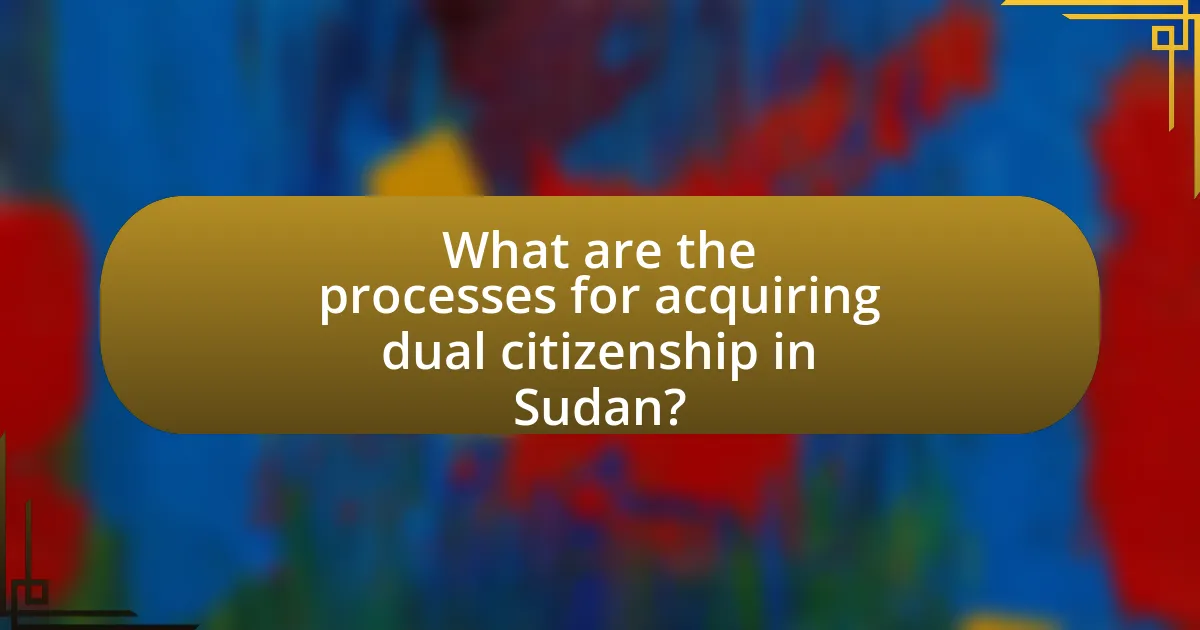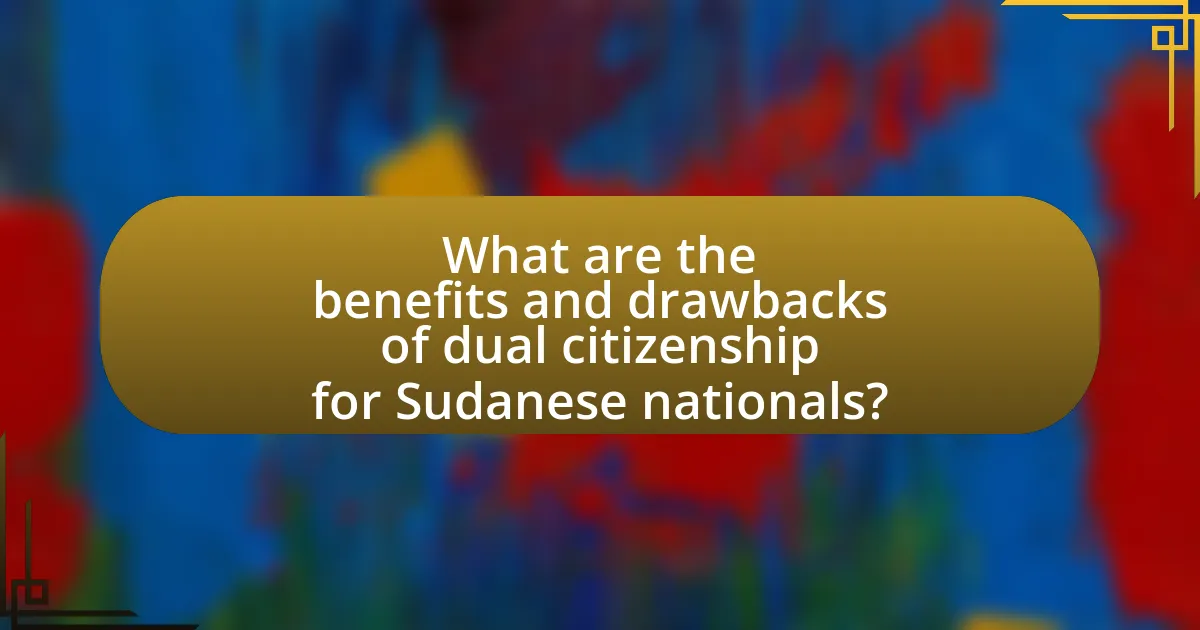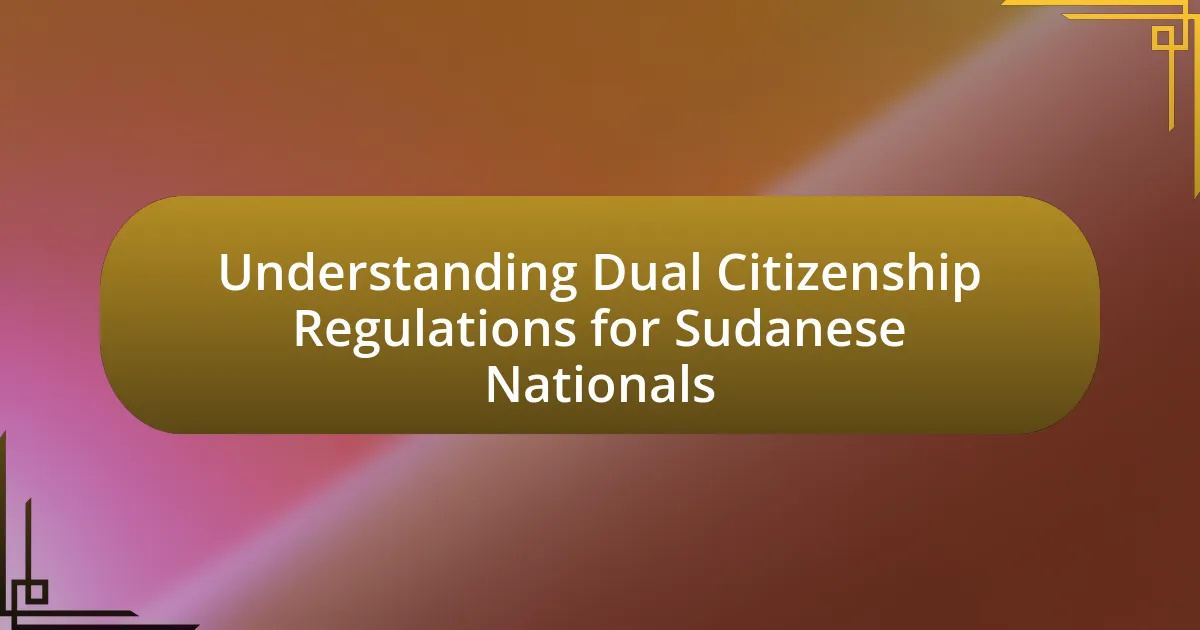The article provides a detailed examination of dual citizenship regulations for Sudanese nationals, primarily governed by the Sudanese Nationality Act of 1994. It outlines that Sudanese citizens are generally prohibited from holding dual citizenship, with specific exceptions for those acquiring nationality by birth or marriage. The article discusses the legal framework, implications of dual citizenship, application processes, required documentation, and potential challenges faced by applicants. Additionally, it highlights the benefits and drawbacks of dual citizenship, including legal obligations, taxation issues, and military service requirements, offering practical tips for navigating the complexities of dual citizenship for Sudanese nationals.

What are the Dual Citizenship Regulations for Sudanese Nationals?
Sudanese nationals are not permitted to hold dual citizenship according to the Sudanese Nationality Act of 1994. This law stipulates that acquiring a foreign nationality results in the automatic loss of Sudanese citizenship. However, there are exceptions for individuals who acquire another nationality by birth or through marriage, which may allow them to retain their Sudanese citizenship under specific conditions. The regulations emphasize that any Sudanese citizen who voluntarily acquires a foreign nationality must renounce their Sudanese citizenship to comply with the law.
How do dual citizenship laws apply to Sudanese citizens?
Sudanese citizens are not permitted to hold dual citizenship according to Sudanese nationality laws. The 1994 Sudanese Nationality Act explicitly states that acquiring a foreign nationality results in the automatic loss of Sudanese citizenship. This law is rooted in the country’s historical context and aims to maintain national integrity. Therefore, Sudanese nationals who obtain citizenship in another country must renounce their Sudanese citizenship to comply with legal requirements.
What is the legal framework governing dual citizenship in Sudan?
The legal framework governing dual citizenship in Sudan is primarily outlined in the Sudanese Nationality Act of 1994. This act permits dual citizenship for individuals who acquire a second nationality by birth or through marriage, but it restricts dual citizenship for those who acquire it through naturalization. Specifically, Sudanese citizens who obtain another nationality must declare their Sudanese citizenship to retain it. The act also emphasizes that dual citizens must adhere to Sudanese laws and regulations.
How does Sudanese law define dual citizenship?
Sudanese law defines dual citizenship as the legal status in which a person is recognized as a citizen of Sudan while simultaneously holding citizenship in another country. According to the Sudanese Nationality Act of 1994, dual citizenship is permitted for individuals who acquire a second nationality by birth or through marriage, but it is generally restricted for those who acquire it voluntarily after reaching adulthood. This legal framework reflects Sudan’s approach to managing citizenship and nationality, balancing national identity with the realities of globalization and migration.
What are the implications of holding dual citizenship for Sudanese nationals?
Holding dual citizenship for Sudanese nationals can lead to both legal and practical implications. Legally, Sudan does not officially recognize dual citizenship for its citizens, which can result in complications such as loss of Sudanese citizenship if a national acquires another citizenship. Practically, dual citizens may face challenges in accessing government services, voting rights, and military obligations in Sudan, as the government may not acknowledge their dual status. Additionally, dual citizenship can complicate legal matters, such as inheritance and property ownership, due to differing laws between the two countries involved.
What rights and responsibilities do dual citizens have in Sudan?
Dual citizens in Sudan have the right to hold citizenship from both Sudan and another country, allowing them to enjoy the benefits and protections of both nations. They are responsible for adhering to the laws and regulations of both countries, which may include obligations such as taxation and military service, depending on the laws of the other nation involved. Sudanese law recognizes dual citizenship, but it also mandates that dual citizens must fulfill their civic duties, such as voting and obeying local laws, while being aware that their rights may be subject to the legal frameworks of both citizenships.
How does dual citizenship affect military service obligations for Sudanese nationals?
Dual citizenship for Sudanese nationals does not exempt them from military service obligations in Sudan. Sudanese law mandates that all male citizens, regardless of dual nationality, are subject to military conscription. This obligation remains in effect unless explicitly exempted by the government. The Sudanese Constitution and military service laws affirm that citizenship status, including dual citizenship, does not alter the requirement for military service. Therefore, Sudanese nationals holding dual citizenship must fulfill their military duties unless they receive a formal exemption.

What are the processes for acquiring dual citizenship in Sudan?
The process for acquiring dual citizenship in Sudan involves several steps, primarily governed by the Sudanese Nationality Act. First, an individual must apply for dual citizenship through the Sudanese Ministry of Interior, providing necessary documentation such as proof of the foreign citizenship, birth certificate, and identification. The application is then reviewed, and if approved, the individual must take an oath of allegiance to Sudan. This process is supported by the legal framework established in the Sudanese Nationality Act, which allows for dual citizenship under specific conditions, particularly for those with Sudanese heritage or connections.
What steps must Sudanese nationals take to obtain dual citizenship?
Sudanese nationals must apply for dual citizenship by submitting a formal application to the Sudanese government, typically through the Ministry of Interior or relevant embassies. The application process requires providing documentation such as proof of citizenship in the other country, identification documents, and any additional forms specified by the Sudanese authorities. According to Sudanese nationality law, dual citizenship is permitted under certain conditions, particularly for those who acquire a second nationality by birth or marriage.
What documentation is required for the dual citizenship application?
The documentation required for a dual citizenship application typically includes a valid passport from each country involved, proof of residency or citizenship in the foreign country, a birth certificate, and any legal documents that demonstrate the applicant’s eligibility for dual citizenship. In the case of Sudanese nationals, additional documents may include a certificate of good conduct and proof of renunciation of previous citizenship if applicable. These requirements are established by the respective governments to ensure compliance with their citizenship laws.
How long does the dual citizenship application process typically take?
The dual citizenship application process typically takes between six months to several years, depending on the specific countries involved and their respective regulations. For Sudanese nationals, the process may be influenced by factors such as the completeness of the application, the responsiveness of the authorities, and any additional documentation required. Countries often have varying processing times; for instance, some may expedite applications for certain categories, while others may have longer review periods due to bureaucratic procedures.
What challenges might Sudanese nationals face when applying for dual citizenship?
Sudanese nationals may face several challenges when applying for dual citizenship, including legal restrictions, bureaucratic hurdles, and potential loss of original citizenship. The Sudanese government has historically imposed strict regulations regarding dual citizenship, often requiring applicants to navigate complex legal frameworks that can vary based on their country of residence. Additionally, the application process may involve extensive documentation and verification, leading to delays and increased administrative burdens. Furthermore, Sudan’s citizenship laws stipulate that individuals may lose their Sudanese citizenship if they acquire citizenship from another country without prior approval, complicating the decision-making process for applicants.
What common obstacles do applicants encounter during the process?
Applicants encounter several common obstacles during the dual citizenship application process for Sudanese nationals, including bureaucratic inefficiencies, lack of clear information, and lengthy processing times. Bureaucratic inefficiencies often result in delays due to inadequate staffing or outdated systems within government offices. The lack of clear information can lead to confusion regarding eligibility requirements and necessary documentation, as applicants may struggle to find reliable resources. Additionally, lengthy processing times can create frustration, as applicants may wait months or even years for their applications to be reviewed and approved. These challenges are frequently reported by individuals navigating the dual citizenship landscape in Sudan.
How can applicants overcome these challenges?
Applicants can overcome challenges related to dual citizenship regulations for Sudanese nationals by thoroughly researching the legal requirements and processes involved. Understanding the specific laws governing dual citizenship in Sudan, including any recent amendments or changes, is crucial. For instance, the Sudanese Constitution and relevant legal frameworks outline the eligibility criteria and application procedures for dual citizenship. Engaging with legal experts or immigration consultants who specialize in Sudanese nationality law can provide applicants with tailored guidance and support. Additionally, joining community groups or forums where individuals share their experiences can offer practical insights and strategies for navigating the complexities of dual citizenship applications.

What are the benefits and drawbacks of dual citizenship for Sudanese nationals?
Dual citizenship offers Sudanese nationals several benefits and drawbacks. The primary benefit is the ability to enjoy rights and privileges in both countries, such as access to education, healthcare, and employment opportunities. For instance, Sudanese nationals holding dual citizenship can work legally in both nations, enhancing their economic prospects. Additionally, dual citizenship can facilitate travel, allowing easier movement between countries without the need for visas.
Conversely, drawbacks include potential legal complications, such as conflicting obligations to both countries, including taxation and military service. Sudanese nationals may face challenges in navigating the legal frameworks of both nations, which can lead to issues like loss of citizenship if one country does not recognize dual citizenship. Furthermore, political instability in either country could complicate the status of dual citizens, affecting their rights and security.
What advantages does dual citizenship offer to Sudanese citizens?
Dual citizenship offers Sudanese citizens several advantages, including enhanced mobility, access to broader economic opportunities, and the ability to participate in political processes in multiple countries. Enhanced mobility allows Sudanese citizens to travel more freely between Sudan and their other country of citizenship, often without the need for visas. Access to broader economic opportunities includes the ability to work, invest, and establish businesses in both countries, which can lead to increased income and improved living standards. Additionally, dual citizenship enables Sudanese citizens to vote and run for office in both nations, thereby increasing their political influence and engagement in governance. These advantages collectively contribute to a more favorable quality of life and greater global integration for Sudanese citizens.
How can dual citizenship enhance travel opportunities for Sudanese nationals?
Dual citizenship can significantly enhance travel opportunities for Sudanese nationals by allowing them to access visa-free or visa-on-arrival options in more countries. For instance, many nations offer easier entry requirements to citizens of countries that have favorable diplomatic relations with Sudan. By holding a second citizenship, Sudanese nationals can benefit from the travel privileges associated with that nationality, which may include access to regions where Sudanese passport holders face restrictions. Additionally, dual citizenship can facilitate smoother travel processes, such as reduced waiting times at borders and the ability to reside or work in the second country, further broadening travel options.
What economic benefits can arise from holding dual citizenship?
Holding dual citizenship can provide significant economic benefits, including access to broader job markets and investment opportunities. Individuals with dual citizenship can work legally in both countries, increasing their employment options and potential income. For instance, a Sudanese national with dual citizenship in a country with a stronger economy may find higher-paying job opportunities and better working conditions. Additionally, dual citizens can invest in properties or businesses in both nations, allowing for diversified income streams and financial growth. This access can lead to enhanced economic stability and wealth accumulation, as evidenced by studies showing that dual citizens often experience higher average incomes compared to single citizens.
What potential disadvantages should Sudanese nationals consider?
Sudanese nationals should consider the potential disadvantages of dual citizenship, including legal complexities and potential loss of rights in their home country. Dual citizenship may lead to conflicting obligations, such as military service or taxation, which can create legal challenges. Additionally, Sudanese law may not fully recognize dual citizenship, potentially resulting in the loss of Sudanese nationality if the individual does not comply with specific regulations. Furthermore, dual citizens may face difficulties in accessing government services or facing discrimination in employment due to their dual status.
How might dual citizenship affect taxation for Sudanese citizens?
Dual citizenship may complicate taxation for Sudanese citizens by subjecting them to tax obligations in both Sudan and their other country of citizenship. Sudanese tax law requires residents to pay taxes on worldwide income, while the other country may have different tax regulations, potentially leading to double taxation. For instance, if a Sudanese citizen also holds citizenship in a country that taxes global income, they could face tax liabilities in both jurisdictions without proper tax treaties in place to mitigate this issue.
What legal complications can arise from holding dual citizenship?
Holding dual citizenship can lead to several legal complications, including conflicting obligations to two countries, potential issues with taxation, and challenges in military service requirements. For instance, individuals may face legal dilemmas when both countries require allegiance, which can result in conflicting legal duties. Additionally, some nations impose taxes on worldwide income, meaning dual citizens could be liable for taxes in both jurisdictions, complicating financial obligations. Furthermore, military service laws may require dual citizens to serve in the armed forces of both countries, leading to legal conflicts regarding conscription. These complications highlight the intricate legal landscape that dual citizens must navigate.
What practical tips should Sudanese nationals consider regarding dual citizenship?
Sudanese nationals should ensure they understand the legal framework surrounding dual citizenship, as Sudan does not officially recognize dual nationality. It is crucial for them to verify the citizenship laws of both Sudan and the other country involved, as this can affect their rights and obligations. Additionally, Sudanese nationals should consult with legal experts or immigration authorities to navigate potential complications, such as loss of Sudanese citizenship or issues related to military service obligations. Keeping updated on any changes in legislation is also important, as laws regarding dual citizenship can evolve.

Leave a Reply